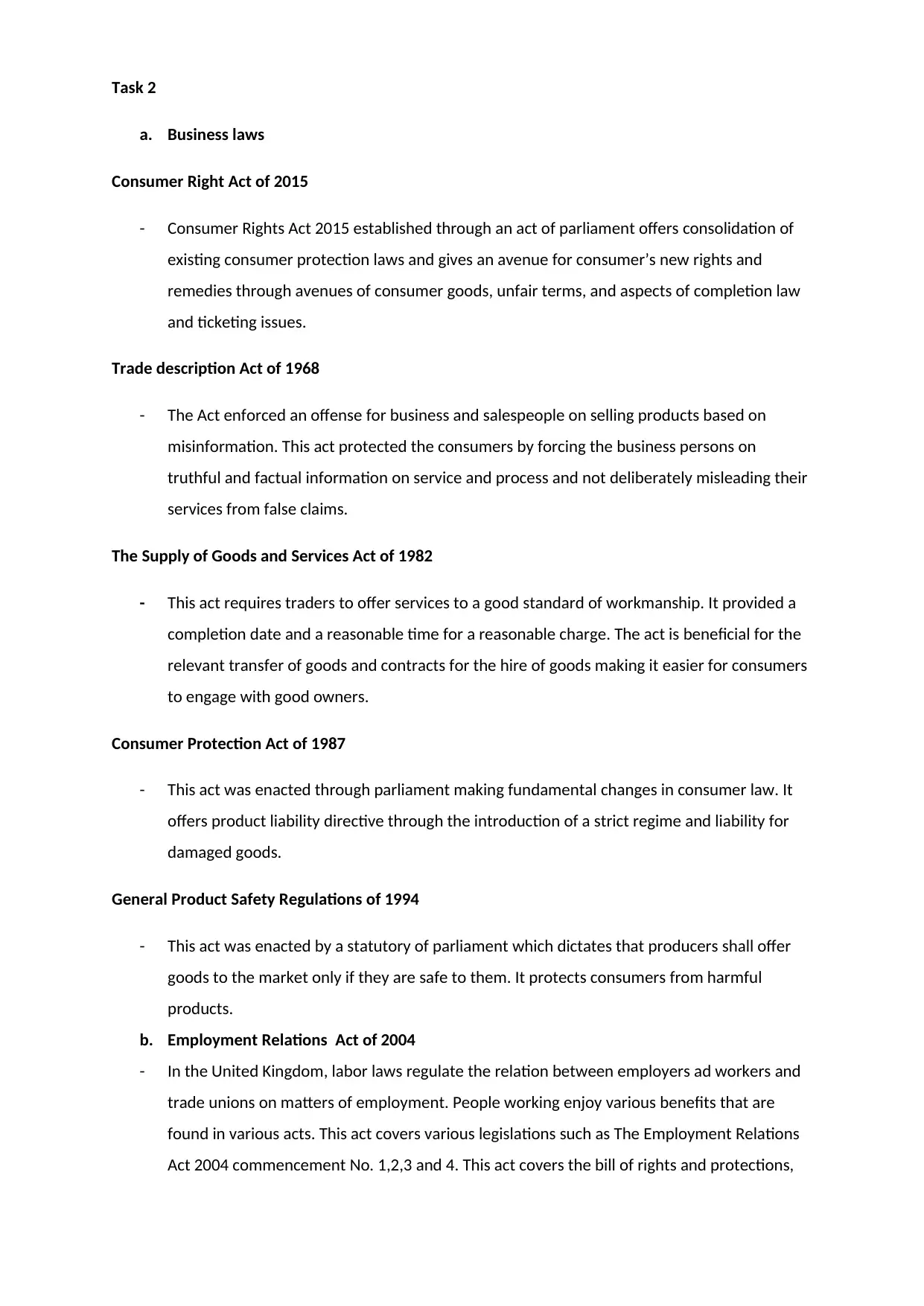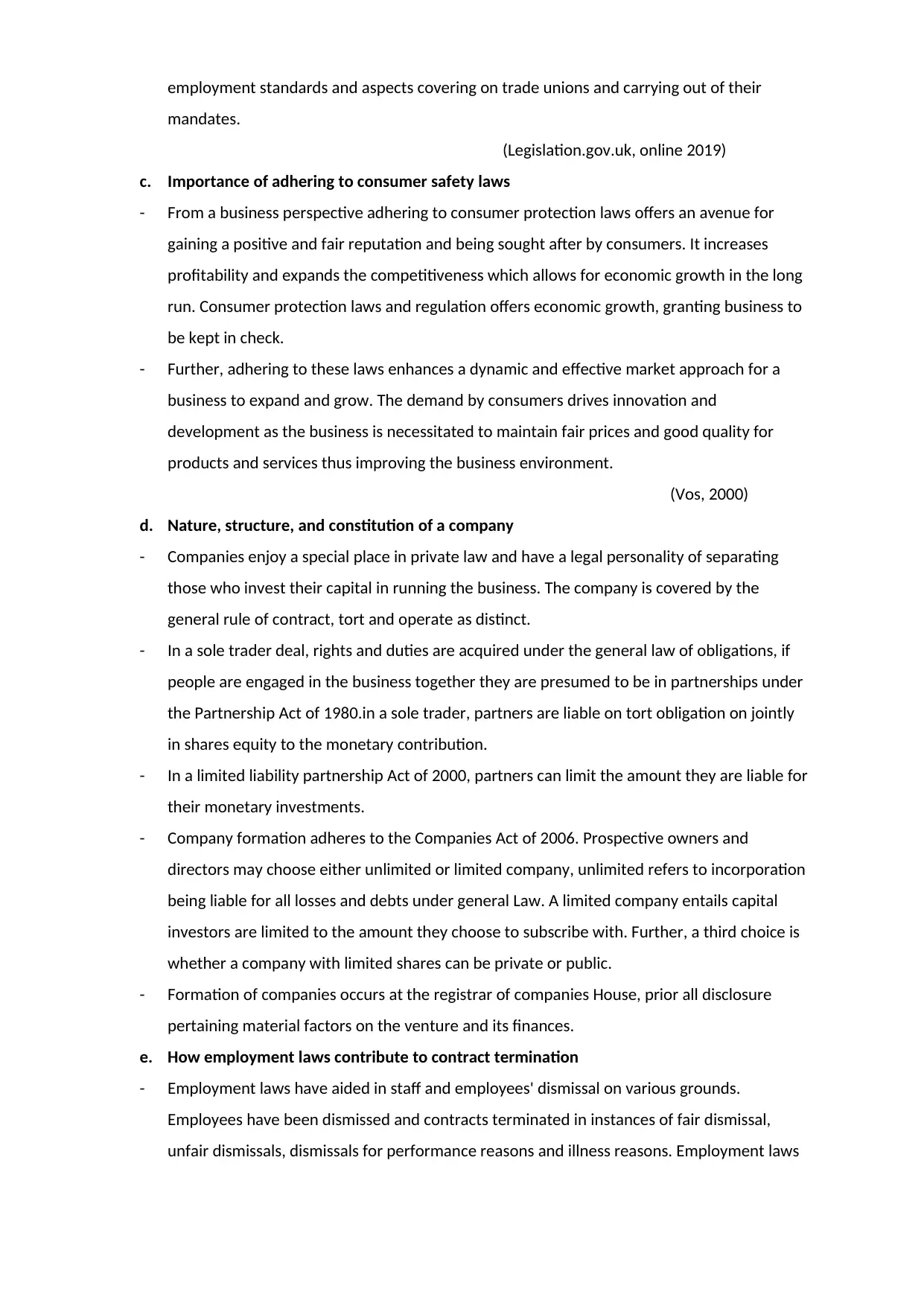Business Law Report: Consumer Rights, Employment, and Companies Act
VerifiedAdded on 2022/09/09
|3
|803
|12
Report
AI Summary
This report provides an overview of key aspects of UK business law. It begins by discussing consumer protection laws, including the Consumer Rights Act 2015, Trade Description Act 1968, Supply of Goods and Services Act 1982, Consumer Protection Act 1987, and General Product Safety Regulations 1994. The report highlights the importance of adhering to consumer safety laws from a business perspective, emphasizing the benefits of a positive reputation and economic growth. It then delves into employment laws, specifically the Employment Relations Act 2004, and how these laws contribute to contract termination. Finally, the report examines the nature, structure, and constitution of a company, including sole traders, partnerships, and limited liability partnerships, and how company formation adheres to the Companies Act 2006.

Task 2
a. Business laws
Consumer Right Act of 2015
- Consumer Rights Act 2015 established through an act of parliament offers consolidation of
existing consumer protection laws and gives an avenue for consumer’s new rights and
remedies through avenues of consumer goods, unfair terms, and aspects of completion law
and ticketing issues.
Trade description Act of 1968
- The Act enforced an offense for business and salespeople on selling products based on
misinformation. This act protected the consumers by forcing the business persons on
truthful and factual information on service and process and not deliberately misleading their
services from false claims.
The Supply of Goods and Services Act of 1982
- This act requires traders to offer services to a good standard of workmanship. It provided a
completion date and a reasonable time for a reasonable charge. The act is beneficial for the
relevant transfer of goods and contracts for the hire of goods making it easier for consumers
to engage with good owners.
Consumer Protection Act of 1987
- This act was enacted through parliament making fundamental changes in consumer law. It
offers product liability directive through the introduction of a strict regime and liability for
damaged goods.
General Product Safety Regulations of 1994
- This act was enacted by a statutory of parliament which dictates that producers shall offer
goods to the market only if they are safe to them. It protects consumers from harmful
products.
b. Employment Relations Act of 2004
- In the United Kingdom, labor laws regulate the relation between employers ad workers and
trade unions on matters of employment. People working enjoy various benefits that are
found in various acts. This act covers various legislations such as The Employment Relations
Act 2004 commencement No. 1,2,3 and 4. This act covers the bill of rights and protections,
a. Business laws
Consumer Right Act of 2015
- Consumer Rights Act 2015 established through an act of parliament offers consolidation of
existing consumer protection laws and gives an avenue for consumer’s new rights and
remedies through avenues of consumer goods, unfair terms, and aspects of completion law
and ticketing issues.
Trade description Act of 1968
- The Act enforced an offense for business and salespeople on selling products based on
misinformation. This act protected the consumers by forcing the business persons on
truthful and factual information on service and process and not deliberately misleading their
services from false claims.
The Supply of Goods and Services Act of 1982
- This act requires traders to offer services to a good standard of workmanship. It provided a
completion date and a reasonable time for a reasonable charge. The act is beneficial for the
relevant transfer of goods and contracts for the hire of goods making it easier for consumers
to engage with good owners.
Consumer Protection Act of 1987
- This act was enacted through parliament making fundamental changes in consumer law. It
offers product liability directive through the introduction of a strict regime and liability for
damaged goods.
General Product Safety Regulations of 1994
- This act was enacted by a statutory of parliament which dictates that producers shall offer
goods to the market only if they are safe to them. It protects consumers from harmful
products.
b. Employment Relations Act of 2004
- In the United Kingdom, labor laws regulate the relation between employers ad workers and
trade unions on matters of employment. People working enjoy various benefits that are
found in various acts. This act covers various legislations such as The Employment Relations
Act 2004 commencement No. 1,2,3 and 4. This act covers the bill of rights and protections,
Paraphrase This Document
Need a fresh take? Get an instant paraphrase of this document with our AI Paraphraser

employment standards and aspects covering on trade unions and carrying out of their
mandates.
(Legislation.gov.uk, online 2019)
c. Importance of adhering to consumer safety laws
- From a business perspective adhering to consumer protection laws offers an avenue for
gaining a positive and fair reputation and being sought after by consumers. It increases
profitability and expands the competitiveness which allows for economic growth in the long
run. Consumer protection laws and regulation offers economic growth, granting business to
be kept in check.
- Further, adhering to these laws enhances a dynamic and effective market approach for a
business to expand and grow. The demand by consumers drives innovation and
development as the business is necessitated to maintain fair prices and good quality for
products and services thus improving the business environment.
(Vos, 2000)
d. Nature, structure, and constitution of a company
- Companies enjoy a special place in private law and have a legal personality of separating
those who invest their capital in running the business. The company is covered by the
general rule of contract, tort and operate as distinct.
- In a sole trader deal, rights and duties are acquired under the general law of obligations, if
people are engaged in the business together they are presumed to be in partnerships under
the Partnership Act of 1980.in a sole trader, partners are liable on tort obligation on jointly
in shares equity to the monetary contribution.
- In a limited liability partnership Act of 2000, partners can limit the amount they are liable for
their monetary investments.
- Company formation adheres to the Companies Act of 2006. Prospective owners and
directors may choose either unlimited or limited company, unlimited refers to incorporation
being liable for all losses and debts under general Law. A limited company entails capital
investors are limited to the amount they choose to subscribe with. Further, a third choice is
whether a company with limited shares can be private or public.
- Formation of companies occurs at the registrar of companies House, prior all disclosure
pertaining material factors on the venture and its finances.
e. How employment laws contribute to contract termination
- Employment laws have aided in staff and employees' dismissal on various grounds.
Employees have been dismissed and contracts terminated in instances of fair dismissal,
unfair dismissals, dismissals for performance reasons and illness reasons. Employment laws
mandates.
(Legislation.gov.uk, online 2019)
c. Importance of adhering to consumer safety laws
- From a business perspective adhering to consumer protection laws offers an avenue for
gaining a positive and fair reputation and being sought after by consumers. It increases
profitability and expands the competitiveness which allows for economic growth in the long
run. Consumer protection laws and regulation offers economic growth, granting business to
be kept in check.
- Further, adhering to these laws enhances a dynamic and effective market approach for a
business to expand and grow. The demand by consumers drives innovation and
development as the business is necessitated to maintain fair prices and good quality for
products and services thus improving the business environment.
(Vos, 2000)
d. Nature, structure, and constitution of a company
- Companies enjoy a special place in private law and have a legal personality of separating
those who invest their capital in running the business. The company is covered by the
general rule of contract, tort and operate as distinct.
- In a sole trader deal, rights and duties are acquired under the general law of obligations, if
people are engaged in the business together they are presumed to be in partnerships under
the Partnership Act of 1980.in a sole trader, partners are liable on tort obligation on jointly
in shares equity to the monetary contribution.
- In a limited liability partnership Act of 2000, partners can limit the amount they are liable for
their monetary investments.
- Company formation adheres to the Companies Act of 2006. Prospective owners and
directors may choose either unlimited or limited company, unlimited refers to incorporation
being liable for all losses and debts under general Law. A limited company entails capital
investors are limited to the amount they choose to subscribe with. Further, a third choice is
whether a company with limited shares can be private or public.
- Formation of companies occurs at the registrar of companies House, prior all disclosure
pertaining material factors on the venture and its finances.
e. How employment laws contribute to contract termination
- Employment laws have aided in staff and employees' dismissal on various grounds.
Employees have been dismissed and contracts terminated in instances of fair dismissal,
unfair dismissals, dismissals for performance reasons and illness reasons. Employment laws

offer avenues in which employee contractual terms can be ended based on the reasons
stipulated and deem right.
References
Legislation. Gov.Uk. The National Archives. Accessed at
http://www.legislation.gov.uk/ukpga/2015/15/contents/enacted. Retrieved 19 March 2019.
Vos, E., 2000. EU food safety regulation in the aftermath of the BSE crisis. Journal of
Consumer Policy, 23(3), pp.227-255.
stipulated and deem right.
References
Legislation. Gov.Uk. The National Archives. Accessed at
http://www.legislation.gov.uk/ukpga/2015/15/contents/enacted. Retrieved 19 March 2019.
Vos, E., 2000. EU food safety regulation in the aftermath of the BSE crisis. Journal of
Consumer Policy, 23(3), pp.227-255.
⊘ This is a preview!⊘
Do you want full access?
Subscribe today to unlock all pages.

Trusted by 1+ million students worldwide
1 out of 3
Related Documents
Your All-in-One AI-Powered Toolkit for Academic Success.
+13062052269
info@desklib.com
Available 24*7 on WhatsApp / Email
![[object Object]](/_next/static/media/star-bottom.7253800d.svg)
Unlock your academic potential
Copyright © 2020–2025 A2Z Services. All Rights Reserved. Developed and managed by ZUCOL.




